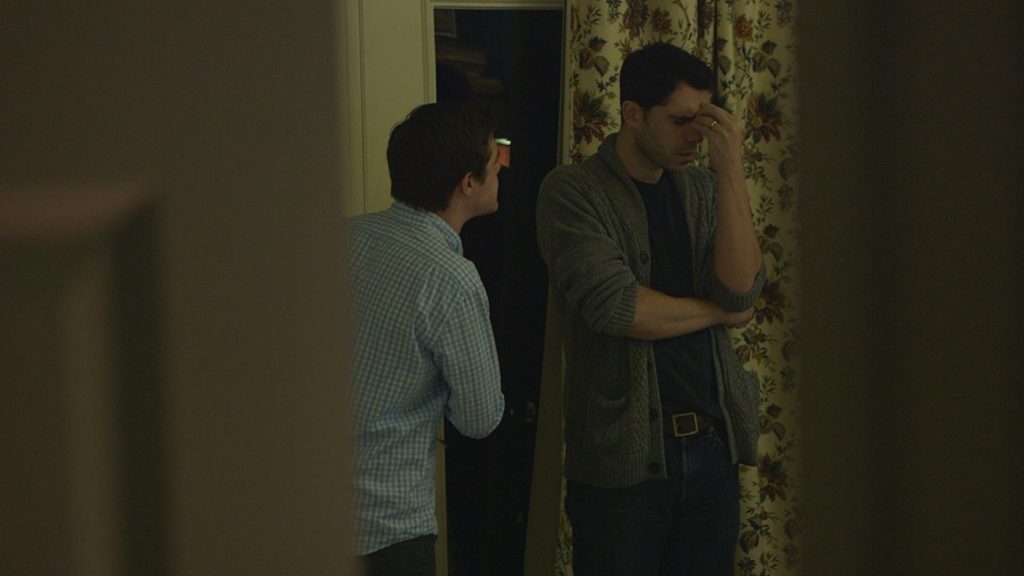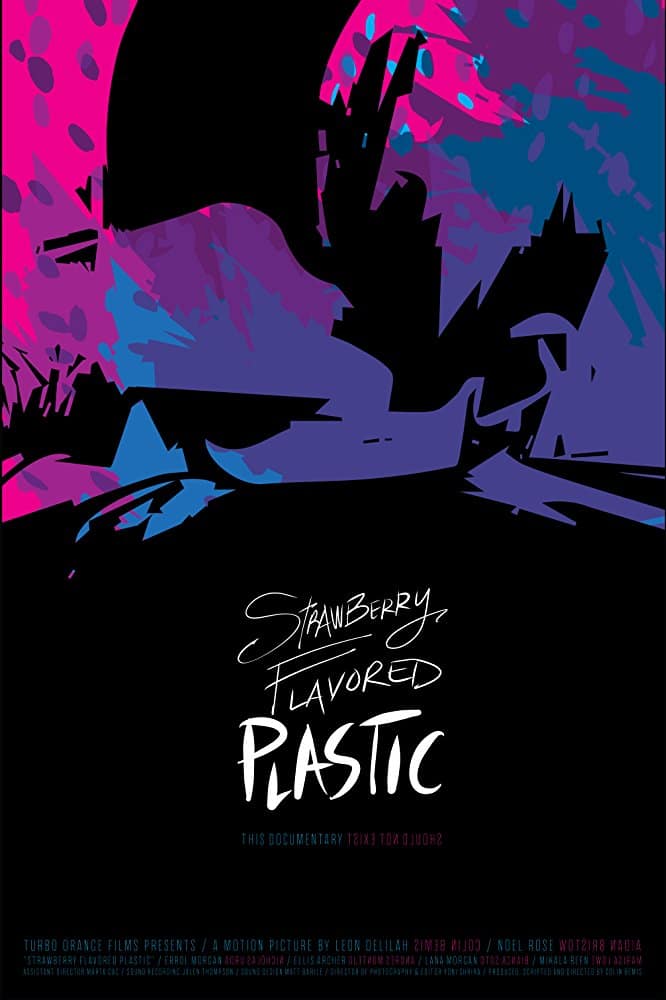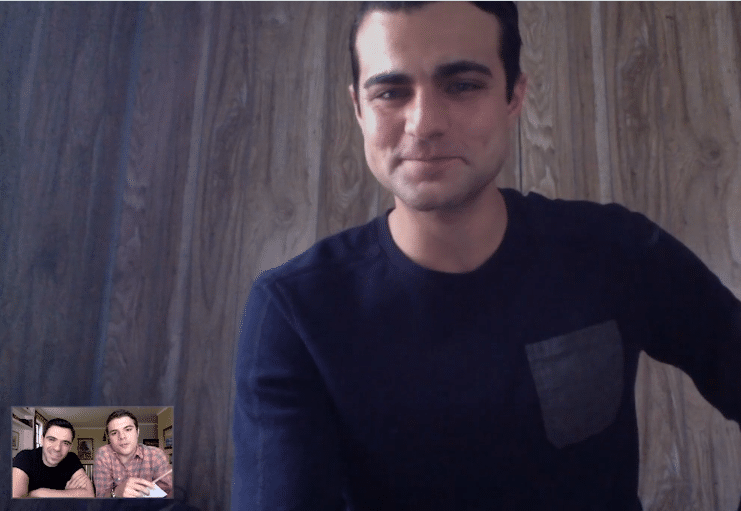 The ‘mockumentary’ format has been used to interesting effect over the years; note that I said ‘mockumentary’ rather than ‘found footage’, a sub-genre which usually conjures more questions than it can ever answer. There are some important distinctions between the two. Strawberry Flavored Plastic dodges the most typical question asked during found footage, which is ‘why are we/you filming?’ by positioning itself as a film about filmmaking, detailing what two filmmakers are willing to go through in order to see their unique angle through to a completed piece of work. In this, it’s reminiscent of a couple of older films – Man Bites Dog and Resurrecting The Street Walker perhaps, though far more subtle and psychological than either of these predecessors.
The ‘mockumentary’ format has been used to interesting effect over the years; note that I said ‘mockumentary’ rather than ‘found footage’, a sub-genre which usually conjures more questions than it can ever answer. There are some important distinctions between the two. Strawberry Flavored Plastic dodges the most typical question asked during found footage, which is ‘why are we/you filming?’ by positioning itself as a film about filmmaking, detailing what two filmmakers are willing to go through in order to see their unique angle through to a completed piece of work. In this, it’s reminiscent of a couple of older films – Man Bites Dog and Resurrecting The Street Walker perhaps, though far more subtle and psychological than either of these predecessors.
Errol and Ellis (Nicholas Urda and Andres Montejo) are aspiring documentarians who have chosen to focus on a spate of NY murders which took place over the preceding years. Believing that the culprit, a charismatic young man called Noel (Aidan Bristow) has served his time for his part in these crimes, they decide to speak with him about his experiences. Very quickly, however, they discover that he hasn’t ever been jailed. In fact, his predilection for violence – his “unscratchable itch” – is ongoing, and something he continues to act upon. Errol and Ellis consider what to do, but they quickly decide to continue to work with Noel, regardless of their initial shock. It’s an opportunity too great for them to give up, come what may. They even decide to bring him fully on board, sharing their equipment with him so that he can film himself. A risky strategy? Certainly. But Noel’s prosaic self-awareness could make for good viewing, and the opportunity to investigate what makes him tick surpasses all other considerations. So, when a figure from Noel’s past returns to his life with some significant news for him which causes him to begin to dangerously unravel, Errol and Ellis are still keen to keep him on board. The divide between filmmaker and subject itself becomes eroded, and the relationships between subject and filmmakers become hazier still.
 This is a slow-building film with ample philosophical elements: our killer spends a lot of screen time pondering the nature of his crimes, after being asked a range of questions by two young men eager to understand what motivates him. Noel is very much the key character here, thanks to an absorbing performance by Aidan Bristow; it’s oddly difficult not to warm to his character, although he is capable of terrible things. Perhaps there are some similarities with early seasons of Dexter here (the ‘unscratchable itch’ and the ‘dark passenger’ are similar ideas), albeit we are never made party to Noel’s internal thoughts in the same way – not if he doesn’t want us, via the film, to know about them. Noel manages to dominate Ellis and Errol’s lives even when he disappears for periods of time. However, despite Noel’s overall dominance of the screen time, the two naive but very driven filmmakers gradually emerge as characters in their own right, not just guys behind cameras. We see them beginning to appreciate the strange quandary they’ve brought upon themselves – and, via them, the film explores the pressures of filmmaking: when is it time to call time on a project? When must you call ‘cut’ for good? When does a good documentary end?
This is a slow-building film with ample philosophical elements: our killer spends a lot of screen time pondering the nature of his crimes, after being asked a range of questions by two young men eager to understand what motivates him. Noel is very much the key character here, thanks to an absorbing performance by Aidan Bristow; it’s oddly difficult not to warm to his character, although he is capable of terrible things. Perhaps there are some similarities with early seasons of Dexter here (the ‘unscratchable itch’ and the ‘dark passenger’ are similar ideas), albeit we are never made party to Noel’s internal thoughts in the same way – not if he doesn’t want us, via the film, to know about them. Noel manages to dominate Ellis and Errol’s lives even when he disappears for periods of time. However, despite Noel’s overall dominance of the screen time, the two naive but very driven filmmakers gradually emerge as characters in their own right, not just guys behind cameras. We see them beginning to appreciate the strange quandary they’ve brought upon themselves – and, via them, the film explores the pressures of filmmaking: when is it time to call time on a project? When must you call ‘cut’ for good? When does a good documentary end?
Strawberry Flavored Plastic has an ambitious structure throughout, and it raises interesting questions regarding the creative process through its blend of static-shot interviews, Skype conversations, video diaries and editing days. So, as you might expect, this is a very dialogue-heavy film indeed which requires close focus to get the best out of its narrative. There are moments of violence during the film, true, but I do feel that a little more would have helped to draw the distinction between the serene, intelligent Noel we usually see, and the man he can be on occasion. We see only glimpses; more would have offset the emphasis on his speech and language. I also feel that, at around one hour forty minutes in duration, a little of the film could have been trimmed; it’s the age-old issue when the film has been written, directed and edited by one person and it’s their own labour of love – it’s not easy to let go of anything. A sequence where Noel plays with a camera, for instance, didn’t add a great deal, and felt a little indulgent.
Still, overall these are minor quibbles, and I think that Strawberry Flavored Plastic is an intelligent and understated piece of work. This is, after all, director Colin Bemis’ first full-length feature; it’s clearly a film which is reaching beyond the most obvious, usual ways of exploring tricky themes, and for that it deserves credit. (Oh, and the title? Yes, it’s explained, but I’m not giving the game away here.)
Strawberry Flavored Plastic will be released on 23rd January 2018 (on Amazon).
